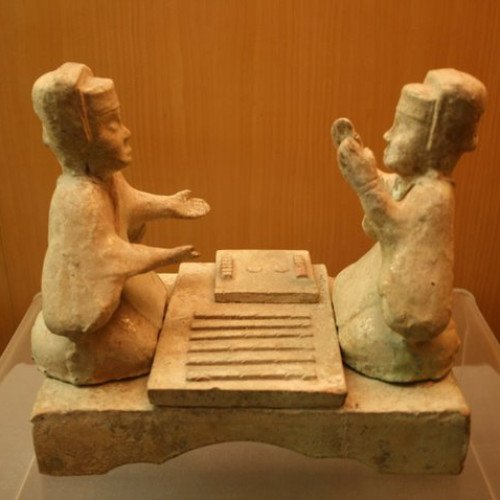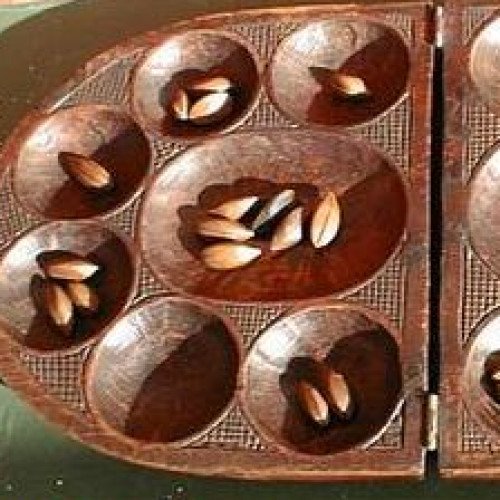LIUBO VS OWARE

LIUBO
Liubo (Chinese: 六博 or 陸博; pinyin: liù bó; Wade–Giles: liu po; lit. 'six sticks') is an ancient Chinese board game played by two players. For the rules, it is believed that each player had six game pieces that were moved around the points of a square game board that had a distinctive, symmetrical pattern. Moves were determined by the throw of six sticks, which performed the same function as dice in other race games. The game was invented no later than the middle of the 1st millennium BCE, and was popular during the Han dynasty (202 BCE – 220 CE). However, after the Han Dynasty it rapidly declined in popularity, possibly due to the rise in popularity of the game of Go, and it became totally forgotten. Knowledge of the game has increased in recent years with archeological discoveries of Liubo game boards and game equipment in ancient tombs, as well as discoveries of Han dynasty picture stones and picture bricks depicting Liubo players. It is not known when the game of Liubo originated, although according to legend it was invented by Wu Cao (烏曹, called Wu Zhou 烏胄 in the early 2nd century CE Shuowen Jiezi dictionary), a minister to King Jie, the last king of the Xia dynasty, who according to traditional chronology reigned 1728–1675 BCE. While there is no archeological or reliable documentary evidence to support the view that Liubo dates back to the Shang dynasty (1600–1046 BCE), early Chinese records do indicate that Liubo was already a popular game by the Warring States period (476–221 BCE). For example, the Records of the Grand Historian records a speech made during the reign of King Xuan of Qi (reigned 319–301 BCE) that claims that the capital city of Linzi was so wealthy that its citizens were all able to indulge in activities such as playing musical instruments, cockfighting, dog racing, playing Liubo and playing kick ball.
Statistics for this Xoptio

OWARE
Oware is an abstract strategy game among the Mancala family of board games (pit and pebble games) played worldwide with slight variations as to the layout of the game, number of players and strategy of play. Its origin is uncertain but it is widely believed to be of Ashanti origin. Played in the Bono Region, Bono East Region, Ahafo Region, Central Region, Western Region, Eastern Region, Ashanti Region of Ghana and throughout the Caribbean, Oware and its variants have many names - Ayò, Ayoayo (Yoruba), Awalé (Ivory Coast, Benin), Wari (Mali), Ouri, Ouril or Uril (Cape Verde), Warri (Caribbean) Pallanguzhi (India) Wali (Dagbani), Adji (Ewe), Nchọ/Ókwè (Igbo), ise (Edo), Awale in (Ga) meaning Spoons in English according to the Ga name for the game. A common name in English is Awari but one of the earliest Western scholars to study the game, Robert Sutherland Rattray, used the name Wari. The game requires an oware board and 48 seeds. A typical oware board has two straight rows of six pits, called "houses", and optionally one large "score" house at either end. Each player controls the six houses on their side of the board, and the score house on their end. The game begins with four seeds in each of the twelve smaller houses. Boards may be elaborately carved or simple and functional; they may include a pedestal, or be hinged to fold lengthwise or crosswise and latch for portability and storage with the seeds inside. While most commonly located at either end, scoring houses may be placed elsewhere, and the rows need not be straight. When a board has a hinged cover like a diptych, the scoring houses may be carved into the two halves of the cover, and so be in front of the players during play. The ground may also be used as a board; players simply scoop two rows of pits out of the earth. In the Caribbean, the seeds are typically nickernuts, which are smooth and shiny. Beads and pebbles are also sometimes used. In the West, some cheaper sets use oval-shaped marbles. Some tourist sets use cowrie shells. The game starts with four seeds in each house. The objective of the game is to capture more seeds than one's opponent. Since the game has only 48 seeds, capturing 25 is sufficient to win the game. Since there is an even number of seeds, it is possible for the game to end in a draw, where each player has captured 24.